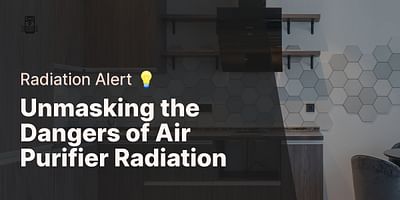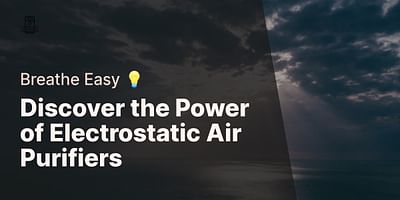Howard is a seasoned HVAC technician with a specialized knowledge in air purifiers. With over a decade of hands-on experience in the industry, he has assisted numerous clients in enhancing their indoor air quality. In his free time, Howard is an avid basketball player and enjoys catching up on his favorite movies.
As an air purifier expert, I've come across many different types of air purifiers, and one type that has generated a lot of discussion is the ozone air purifier. Ozone air purifiers are known for their ability to remove odors and kill bacteria, but they also come with some potential side effects that you should be aware of before deciding to use one in your home.
First and foremost, it's important to understand that ozone is a powerful oxidant. While this can be beneficial in breaking down pollutants and odors, it can also be harmful to your health if you're exposed to high levels of ozone. The most common side effect of using an ozone air purifier is respiratory irritation. This can manifest as coughing, wheezing, shortness of breath, and chest pain. People with pre-existing respiratory conditions, such as asthma or COPD, may be particularly sensitive to the effects of ozone.
In addition to respiratory irritation, exposure to high levels of ozone can also lead to other health issues. Some people may experience headaches, dizziness, or fatigue as a result of ozone exposure. Long-term exposure to ozone has been linked to more serious health problems, such as an increased risk of developing respiratory infections and a decreased lung function.
Another potential side effect of using an ozone air purifier is the production of harmful byproducts. When ozone reacts with certain chemicals in the air, it can create new compounds that are potentially more harmful than the original pollutants. For example, when ozone reacts with volatile organic compounds (VOCs), it can produce formaldehyde, a known carcinogen.
Given these potential side effects, it's essential to use an ozone air purifier responsibly. If you decide to use one in your home, make sure to follow the manufacturer's guidelines for proper use and maintenance. This may include running the air purifier only when you're not in the room and ensuring that the ozone output is within safe limits.
If you're concerned about the side effects of using an ozone air purifier, there are plenty of other air purifier options available that do not produce ozone. HEPA air purifiers are a popular choice, as they can effectively remove particles and allergens from the air without producing any harmful byproducts. Activated carbon filters can also help to remove odors and VOCs without the need for ozone.
In conclusion, while ozone air purifiers can be effective at removing odors and killing bacteria, they also come with some potential side effects that you should be aware of. If you're considering using an ozone air purifier, make sure to weigh the benefits against the potential risks and explore alternative air purifier options if necessary.















